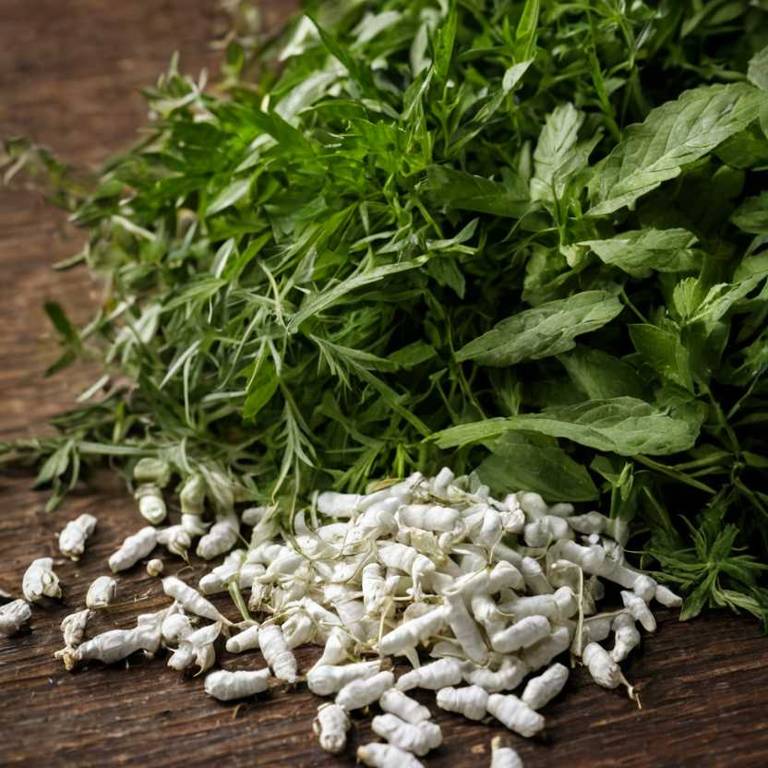White Mulberry (Morus alba)
White Mulberry (Morus alba) is a member of the Moraceae family, native to Asia, Eastern Asia, and China. Traditionally, its leaves, fruits, and stems have been used for decoctions, infusions, and poultices.
This herb is particularly valued for its anti-inflammatory, tonic, and diuretic actions, and has a long history of use in traditional chinese medicine, japanese kampo medicine, and european herbal medicine.

Quick Facts / Key Information
| Common Name | White Mulberry |
|---|---|
| Scientific Name | Morus alba |
| Plant Family | Moraceae |
| Genus | Morus |
| Species | alba |
| Native Range | Asia, Eastern Asia, China |
| Plant Parts Used | Leaves, Fruits, Stems |
| Primary Medicinal Actions | Anti-Inflammatory, Tonic, Diuretic |
| Primary Traditional Systems | Traditional Chinese Medicine, Japanese Kampo Medicine, European Herbal Medicine |
| Historical Preparation Methods | Decoction, Infusion, Poultice |
Botanical Identity
- Scientific Name
- Morus alba
- Common Name
- White Mulberry
- Synonyms / Alternative Names
- Common Mulberry, Morus, Silk Cotton Tree
- Plant Family
- Moraceae
- Genus
- Morus
Botanical Description
- Growth Habit
- Perennial herbaceous plant.
- Height
- It typically reaches a height of 10 to 30 meters.
- Leaves
- Ovate leaves with serrated margins, upper surface pale green, lower surface white pubescent.
- Flowers
- Flowers are actinomorphic, white, solitary, with five sepals and five petals, each petal narrowly ovate with a distinct midrib.
- Stems
- Woody, erect, branched, with smooth, grayish bark, and opposite leaf arrangement.
Traditional Uses / Historical Use
Traditional Systems
- Traditional Chinese Medicine
- Japanese Kampo Medicine
- European Herbal Medicine
- Korean Traditional Medicine
Historical Preparation Methods
- Decoction
- Infusion
- Poultice
- Powder
Medicinal Actions
- Anti-inflammatory
- Traditionally described as a gentle anti-inflammatory, for irritation-related applications.
- Tonic
- As described in traditional systems, a moderate tonic, for foundational support.
- Diuretic
- Historically regarded as a warming diuretic, for moisture-related balance.
- Expectorant
- In herbal literature, noted as a mild expectorant, in chest-related herbal contexts.
Active Compounds
- Flavonoid
- A chemical class commonly identified in plant tissues, especially flowers and leaves.
- Tannin
- High-molecular-weight phenolic compounds found in many plant species.
- Phenolic Acid
- Organic acids commonly occurring as part of plant secondary metabolism.
- Coumarin
- Organic compounds biosynthesized as part of plant secondary metabolism.
Modern Research Overview
Contemporary research on this plant includes areas such as chemical analysis, laboratory-based studies, and observational research. Detailed summaries of published findings are not included at this stage and will be added during future content updates.
Safety & Contraindications
- General Precautions
- Caution is advised in certain contexts based on traditional use and available information.
- Contraindications
- Available information does not clearly establish contraindications for the use of this herb.
- Allergies
- Sensitivity or allergy-related effects have not been clearly established.
- Drug Interactions
- There is insufficient evidence to determine whether this herb interacts with pharmaceutical drugs.
- Toxicity
- There is insufficient evidence to determine the toxic potential of this herb.
- Pregnancy & Breastfeeding
- There is insufficient evidence to determine the safety of this herb during pregnancy or breastfeeding.
Preparation & Usage Methods
- Infusion
- Water is poured over plant material and allowed to steep before straining.
- Decoction
- Plant parts are gently boiled in water to release soluble constituents.
- Poultice
- Plant parts are crushed or moistened and placed directly on the body.
- Powder
- This method converts dried plant material into a uniform powder.
- Culinary Use
- Leaves, flowers, or roots are used as ingredients in culinary preparations.
Growing, Harvesting & Storage
Growing / Cultivation
- Soil
- Prefers loamy soil with well-drained conditions. Typically grows best in organically rich soils.
- Sunlight
- Thrives in full sun. Tolerates full sun to partial shade.
- Watering
- Prefers well-balanced moisture levels. Tolerates periodic dry conditions.
Medical Disclaimer
The information provided on this page is for educational and informational purposes only. It is not intended to diagnose, treat, cure, or prevent any medical condition. Always consult a qualified healthcare professional before using any herb for medicinal purposes.